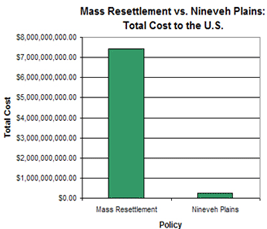|
 |
| |
 |
 |
 |
| Download PDF |
 |
Local Development or Mass Resettlement:
Costing the Options for Iraq’s Minorities |
The US Government must begin acknowledging the escalating minority crisis in Iraq. 1 in 3 Christian ChaldoAssyrians is a refugee and an even greater percentage are internally displaced persons (IDPs). By every definition, an ethno-religious cleansing is taking place. Two policies stand before the US in confronting the realities of the crisis. Mass resettlement is one option; while the other is providing meaningful opportunities through local development of the Nineveh Plain for ChaldoAssyrians and other minorities there.
A step towards mass resettlement occurred with the language in the ‘National Defense Authorization Act for Fiscal Year 2008’ (hereafter, ‘the Act’). It is the ‘Priority Two’ refugee classification used in ‘the Act’ for the resettlement of 20,000 Iraqis which can generate a mass exodus of Christian ChaldoAssyrians seeking to escape an Iraq where they are not being given viable options to remain. 1
The Nineveh Plain policy’s only real measure of progress came with the amendment to the State Foreign Operations appropriation, which calls for the use of not less then $10 million for religious minority IDPs in the Nineveh Plain.
|
Using the Department of State’s FY 2008 budget request for its refugee resettlement program provides the best indicator of the cost to get a refugee to US soil. Their budget of $722,800,000 for resettling 80,000 refugees to the US indicates a cost of $9,035 per refugee. Once in the US, the federal government through the Office of Refugee Resettlement will spend an average of $7,487 per refugee for almost a year on medical, social welfare, and cash assistance programs. Not factoring the host of other spending programs on refugees, the US will spend $16,500 per refugee. |
 |
|
In early 2005, ISDP issued the Nineveh Plain Needs Assessment, providing for the overall reconstruction and development infrastructural needs of the region for all inhabitants, across ethnic and religious lines. It totaled $236 million. This spending alone would provide for the 450,000 ChaldoAssyrians, Shabaks, Yezidis and others inhabiting the area and can account for the IDP influx up to this point in time.
In absolute terms, the Mass Resettlement policy for just those in the Nineveh Plain would cost $7.43 billion versus the $236 million for giving minorities an enduring solution through the Nineveh Plain policy.
At less than one twentieth of the cost of the mass resettlement policy, 450,000 members of Iraqi minority groups can remain in Iraq instead of being resettled in the US. The per capita cost of the Nineveh Plain policy would be $525 to keep them in a stable environment in Iraq (or, just 3.2 percent of the mass resettlement policy).
On purely a cost basis, the choice seems clear. The Nineveh Plain policy is a far more feasible policy for the United States. These decisions are difficult to make as they have real consequences for 100,000s of lives. However, if decision-makers consider that the Nineveh Plain policy will maintain a population inclined to ‘moderation’ inside Iraq, it also serves to reinforce America’s strategic plan of confronting ‘extremism’ in the framework of the National Strategic Plan for the War on Terror. Lastly, the Nineveh Plain policy keeps alive the possibility of Iraq staying a truly pluralistic society – a key variable for leveraging democracy. |
| |
| 1 See chapter entitled ‘Iraqi Refugee Crisis’, ‘Subtitle C’ – Sections 1241 to 1249. |
2 See the State Profiles for the assistance averaged across Michigan, Chicago, and California at the Office of Refugee Resettlement in the US Department of Health and Human Services:
http://www.acf.hhs.gov/programs/orr/data/state_profiles.htm. |
| |
| Download PDF |
|